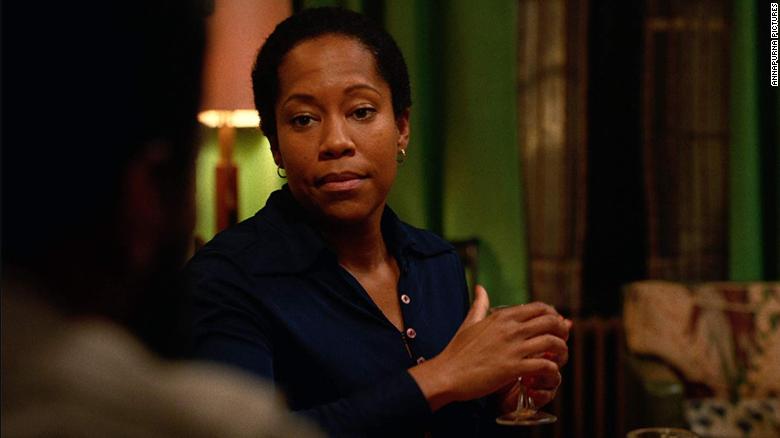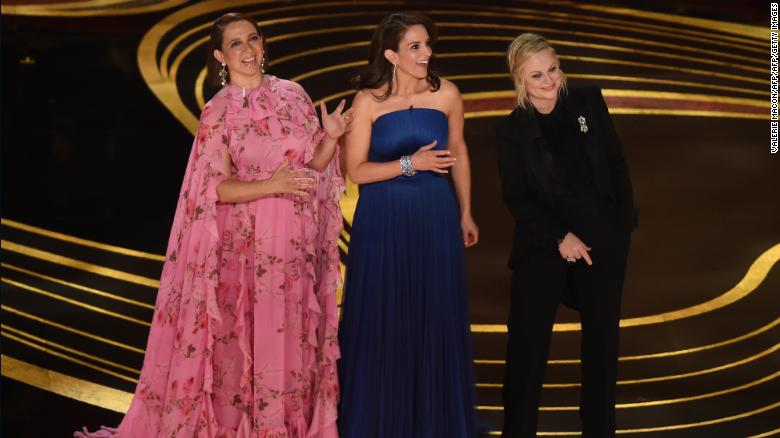
The Oscars offered music and comedy bits to kick off a host-free ceremony, moving briskly through the night’s opening awards in seeking to meet the mandate to bring in the show at a shorter-than-usual three hours.
The Marvel blockbuster “Black Panther” claimed two of the night’s early awards, and made history in the process: Ruth E. Carter and Hannah Beachler became the first African-American women to win for costume design and production design, respectively.
A tearful Regina King took the first award of the night, winning best supporting actress for “If Beale Street Could Talk,” director Barry Jenkins’ adaptation of the James Baldwin novel.
Honors followed for “Free Solo,” a hit documentary about daredevil climber Alex Honnold, topped the documentary feature category, which also included the Ruth Bader Ginsburg biography “RBG.” In their enthusiasm, one of the filmmakers blurted out an expletive that was promptly bleeped.
In an expected victory, the team that transformed Christian Bale into former Vice President Dick Cheney won in makeup/hairstyling for “Vice.”
“Saturday Night Live” alums Tina Fey, Maya Rudolph and Amy Poehler introduced Sunday’s telecast, following Queen and Adam Lambert’s opening performance of “We Will Rock You” and “We Are the Champions,” highlighting the Oscar-nominated hit “Bohemian Rhapsody.” They riffed off the messy build-up to this year’s awards, with Rudolph quipping in reference to things that wouldn’t be happening, “Mexico is not paying for the wall.”

An abundance of drama surrounded the build-up to this year’s Oscars, even before getting around to the unusually wide-open race for the best-picture prize.
The contenders for that night-capping trophy have set the stage for what could be a night of historic firsts. They run the gamut of an evolving movie industry, with “Roma” — a black-and-white film from Mexican director Alfonso Cuaron, for which no box-office data has been made available — vying to become the first Netflix movie to land those honors, as well as the first foreign-language film in an increasingly global business.
On the flip side, “Black Panther” became the first superhero movie to garner a best-picture nomination, representing the sort of blockbusters upon which the studios have come to rely. The Marvel production is the third-highest-grossing US release of all time, at $700 million, and nearly doubled that total worldwide.
A number of individual nominees could also mark breakthroughs for women and people of color, only a few years after lack of diversity among the acting categories birthed the #OscarsSoWhite hashtag.
More broadly, the guilds representing actors, writers, directors and producers have all selected different films in the run-up to the Oscars, an unprecedented absence of consensus that has only heightened suspense regarding what might win.
The Academy of Motion Picture Arts and Sciences has endured a series of controversies, beginning with the proposal to introduce a “popular film” category. That idea was quickly scuttled, as was a subsequent plan to move four awards into the commercial breaks to help streamline the ceremony, which prompted a rebellion from Academy members.
In between, Kevin Hart was chosen to host the awards, before the resurfacing of homophobic social-media posts prompted the comic to withdraw. After a period of confusion, it was finally confirmed the awards would be mounted without a host, the first time that’s happened in 30 years.
Much of the tumult surrounding the 91st annual Oscars can be traced back to last year’s awards — and more specifically, a precipitous ratings decline, falling to an all-time low. Shortening the ceremony to three hours, or close to it, has been among the solutions that host network ABC has advocated as a means of stopping the bleeding from a Nielsen standpoint.
ABC and the Academy remained secretive about most of the elements in advance of this year’s show, which only added — fairly or not — to a sense of chaos behind the scenes.
As reported by CNN
